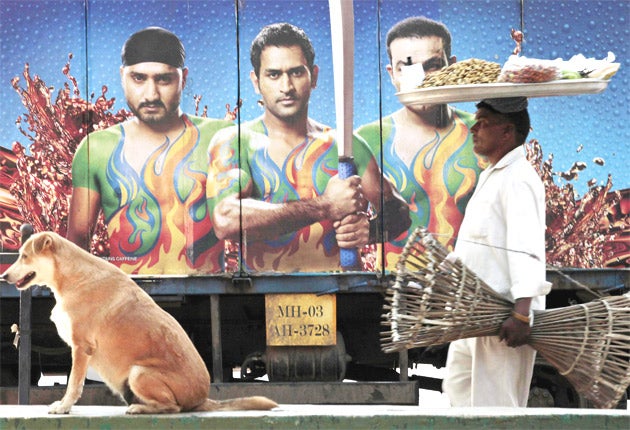Cricket World Cup hosts hope global gathering repairs their reputations
India and Bangladesh are eager for a successful event for reasons that go beyond the boundary

In Bangladesh, beggars have been paid to keep off the streets, £60m has been spent giving buildings a new lick of paint and Bryan Adams, along with 3,000 folk dance performers, is busily limbering up for the opening ceremony. In Sri Lanka, officials at Hambantota are hoping monsoon rains hold off and do not spoil their careful preparations in the home district of the country's president, Mahinda Rajapaksa. In India, where cricket is followed like nowhere else on earth, locals are praying that the nation can secure the title and by doing so provide the only piece of silverware missing from the trophy cabinet of the sporting deity that is known as Sachin Tendulkar.
The 2011 Cricket World Cup officially gets underway today, with the 51-year-old Canadian rocker Adams headlining the opening event in the Bangladesh capital, Dhaka. The tournament's first match takes place two days later in the city's Sher-e-Bangla stadium when Bangladesh take on India (one of the hosts' opening games, therefore, strangely being played abroad).
Across the three south Asian nations hosting the tournament – Pakistan was to have been the fourth but that changed following the 2009 militant attack on the Sri Lankan team – anticipation has been building. It is true that the buzz is not as feverish as some may have expected, but officials believe that once the games start, so the excitement will grow. "It's more than a smell of cricket in the nostrils. It has a tear-gas effect," wrote the former Indian player Ravi Shastri, who played in 1983 when India won the event and triggered a new wave of one-day mania across the country. "Everything around us has been sprayed with the World Cup coming up. Everyone is hoping it lives up to its billing."
If the anticipation of the sporting marathon that lies ahead – there is likely to be seven hours of live cricket televised every day for the next seven weeks – is a little less than some would have hoped, there are a number of reasons why. One is that there is so much cricket being played that both fans and players can grow a little weary. At the weekend, India's captain, MS Dhoni, made little effort to hide his fatigue. "35 ODIs, 10 Tests, 45 days of Indian Premier League and Champions League to be exact," he sighed.
The main problem, however, at least in India, appears to be the very success of the 20-over bashathon IPL, the world's largest and wealthiest tournament and the one that secures the lion's share of both sponsorship and excitement. "The [50-over] World Cup is more for the hard-core fan than the casual spectator," said one Indian fan in Delhi this week. "It's not for the really hardcore fan – they prefer Tests."
For the 14 nations competing – Australia, Bangladesh, Canada, England, Ireland, Kenya, India, Netherlands, New Zealand, Pakistan, South Africa, Sri Lanka, West Indies and Zimbabwe – there is everything to play for, even if the lengthy group stage means there are unlikely to be any major upsets. For some countries, the drive to play well is not entirely about cricket.
For Pakistan, whose up-and-down team is often politely described as mercurial, there is the opportunity to repair the damage to their image in the wake of the spot-betting scandal.
If they play well, it might also go some way to easing the nation's disappointment that its right to co-host the event was taken away after the Lahore attacks. "It's very sad," said Sufi Abdul Jalil, Pakistan cricket's most famous fan who has been following the team for 30 years. "But it's something which is beyond our control and under the circumstances it would not have been enjoyable with fear and tension all the time."
For Bangladesh, which is hosting eight of a total of 49 matches, the tournament is the biggest sporting event the country has hosted since securing independence in 1971 and senior officials believe it is a chance to improve the nation's image as a place notorious for natural disasters and poverty. In addition to the move to keep away the beggars and spruce up Dhaka and the second city, Chittagong, efforts have been made to tackle the capital's fume-choked traffic. "In the present world perspective, sports are not a mere entertainment, rather they help brand a country," Bangladesh's prime minister, Sheikh Hasina, said this week.
India, meanwhile, is anxious on two fronts. Firstly, it is hoping the tournament passes off smoothly after the embarrassing débâcle of the Commonwealth Games preparations, which highlighted the grip of corruption and mismanagement. The failure of Kolkata's Eden Gardens to be declared fit to host matches did nothing to ease anxiety. India is also nervous about security and has made rigorous preparations to avoid a Mumbai-style attack.
From a cricketing perspective, India also bears the pressure of entering the tournament not just as hosts but as favourites. "Because for the first time in 20 years, they have a side that's not just favourites on paper, but have it in them to win this tournament," said Mumbai-based sports writer Venkat Ananth. India might not want it any other way. But given the expectations of the Indian fans and that this will likely be Tendulkar's final World Cup, once the matches get going there will be no shortage of tension. "There's no side issues of players' rights or administrative conflicts," added Shastri. "It's as good a chance as ever for the game's stakeholders to seize the ground they have yielded."
Join our commenting forum
Join thought-provoking conversations, follow other Independent readers and see their replies
Comments
Bookmark popover
Removed from bookmarks